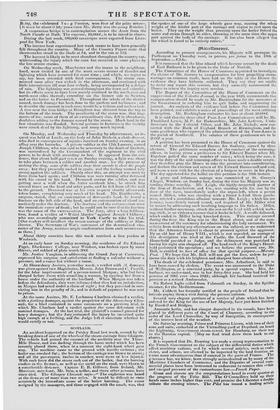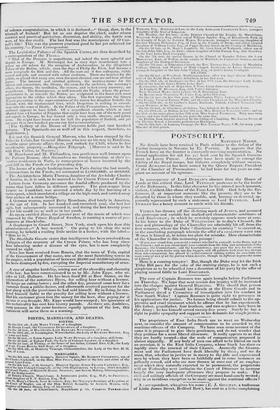Midttliattratil.
According to present arrangements, his Majesty will prorogue the Parliament on Thursday next, in person, pro forma to the 19th of September.—Globe.
It is rumoured that the blue riband which became vacant by the death of Earl Bathurst is to be given to the Duke of Norfolk.
The Committee of the House of Commons appointed to investigate the claims of Mr. Gurney to compensation for first propelling steam. carriages on common roads, have laid on the table of the House the evidence they have hitherto collected. They say they are unable to make any report this session, but they earnestly recommend the House to renew the inquiry next session.
The Report of the Committee of the House of Commons on the suppression of the Calcutta Journal, in the year 18.23, recomtnends that
compensation should be !nude to Mr. Buckingham for the measures of the Government in ordering him to quit India, and suppressing the journal. An analysis of the evidence laid before the Committee has been printed, and exhibits a series of proceedings of the most arbitrary description. Mr. Buckingham estimates his loss at about 50,000/.
It is said that the three chief Poor-Law Commissicmers will be Mr. Frankland Lewis, M. I'. for Radnorshire, Mr. John Lefevre, Under Secretary it) the Colonial Office, and Mr. John Nichols, now connected with the Bank of England Branch at Birmingham, and the same gentleman who improved the administration of the Poor-Laws in the parish of Southwell. The salaries of these gentlemen are to be 2000/. a year.
A petition has been presented to the House of Commons against the return of General Sir Edward Barnes for Sudbury, signed by three electors. The petitioners complain of the conduct of the returningofficer, in halving given a preference to Sir Edward Barnes when Mr. 13agshaw polled the same number of votes ; which being the case, it was the duty of the said returning-officer to have made a double return: they therefore pray the House to take the premises into consideration, and declare the election and return of Sir Edward Dames null and void, and issue a new writ for the election of a burgess to serve in his place. The day appointed for the ballot on this petition is the 19th instant.
A gross and infamous outrage was committed at St. George's Chapel, Windsor, on Sunday last, during the time his Majesty was attending divine worship. Mr. Leigh, the highly-respected partner of the firm of Ramsbottom and Co., N'as standing with his son by the door of the nave, immediately under the organ-loft, when a person maned Miller, who was standing with a friend bshind these gentlemen, uttered a scandalous allusion towards Mr. Leigh ; which his son hearing, immediately turned round, and inquired of Mr. Miller what be meant by addressing such insulting language to his father. Miller, without further ceremony, struck the son on the head with a thick walking-stick, in so violent at manner that it broke in half. A scuffle followed, which ended in Miller being knocked down. This outrage occured during the time the King was in the Royal closet, and at the commencement of the ceremony for administering the holy sacratnent. We refrain from making any observations on the subject, as we understand that the AttorneyGeneral is about to proceed against the aggressor. By an old law of Henry VIII., which is not repealed, an outrage of this description was tried at the Castle, the Lord Steward of the Household presided as Judge, and the delinquent was punished by having his right arm chopped off. The head cook of the King's Household performed the operation ; and we believe the present one, Mr. Ball, is entitled to fees of office for that special purpose.—Morning Post. [We hope that Mr. Ball will not get the fees, unless be performs the duty with his brightest and sharpest bone-cleaver.]
The death of the celebrated pensioner, Mrs. Arbuthnot, is said to have been caused by cholera. The event was announced to the Duke of Wellington, at a convivial party, by a special express. Mrs. Arbuthnot, we understand, was in her forty-first year. She had held her pension of 936/. ever since 1823; although her husband received his pension as a retired Ambassador. Sir Robert Inglis sailed from Falmouth on Sunday, in the Spitfire steamer, for the Mediterranean.
Mr. Cobbett has formally notified to the people of Ireland that he intends paying them a visit during the present autumn.
Several very elegant portions of a service of plate which has been ordered by the King for the use of her Majesty, have just been finished by Bendel! and Bridges.
Aromatic herbs, and hot vinegar deposited in tin vessels, have been placed in different parts of the Court of Chancery, according to the order of the Lord Chancellor, by way of fumigation, in consequence of the intense heat of the weather.
On Saturday morning, Prince and Princess Lieven, with two of their sons and suite, embarked at the Victualling-yard at Deptford, on board the Lightning, Government steam-vessel, for Hamburg, on their way to the Russian capital. May no foul wind drive them back to our shores.]
It is reported that Dr. Bowring has made a strong representatiofl. to the French Government oil the subject of the differential duties which affect maritime nations, arid by which several articles, such as coals, slates, and others, are allowed to be imported by the land frontier, 011 terms more advantageous than if entered in the ports of France. The grievance has, we know, been strongly animadverted on by many of the Maritime Chambers of Commerce, and the Deputies of several con" mercial places have been instructed to endeavour to remove this unfair and unequal pressure of the customhouse law.—French Paper.
Great and sincere are the congratulations heard in every quarter at the progress of the Tithe Bill. The O'Connellites hold up their heads some inches higher than ever, rind promise the Liberator a double' tribute the ensuing winter. The Pilot has issued a leading article
of solemn congratulation, in which it is declared—" Great, then, is the triumph of Ireland ! But let us not deprive the chief, under whose conduct and practical patriotism, discretion, and ability, the battle was won, of his due credit. The last feat was the masterpiece of O'Connell's life ! This was the greatest practical good he has yet achieved for his country."—Times Correspondent.
The Legislative Palaces of the Spanish Cortes, are thus described by a correspondent of the Times— That of the Proceres is magnificent, and indeed the most splendid and to.egant in Europe. M. Marintegui has in sixty days transformed into a palace an old saloon for the reception of Ambassadors, in the dilapidated Palace of the Retiro' which, since the days of Philip the First, had become a mere receptacle for filth and dirt. All the seats are af tine mahogany, richly carved and gilt, and covered with velvet cushions. There are benches for the public, so placed that every one, even the most elevated, can see and hear all that asses The internal aad extetnal galleries, the meeting-rooms for the
• officers and committees, the library, the room for the archives, the secretary's
offices, the throne, the vestibules, the statues, and in fact every accessory, are magnificent. The frontispieces, as well towards the Prado, where the principal entrance is, as towards the Retiro, are sculptured in the finest style most appropriate to the edifice which they adorn. The first represents the Queen It gent presenting to the representatives of the nation her daughter Isabella the Second, with the fundamental laws, while Despotism is sinking in convulsions into the arms of Death. In the Palace of the Procuradores, -however, the architect appears to have failed. Of a magnificent church, which at once afforded him a Chamber of Deputies that might have been one of the most grand and superb in Europe, be has formed only a very small, obscure, and paltry rum. He might have found seats for half the population of Madrid, and yet not more than two hundred persons can find accommodation."
[The Gallery of the House of Commons holds just two hundred persons. The Spaniards are as well off in this respect, therefore, as Englishmen.]
It is not the Spanish General Moreno, who has been stopped by the Police in Calais, but General Maroto, who was on his way to Bordeaux, to settle some private affairs there, and embark for Chili, where he has considerable property. —Hampshire Telegraph. [Moreno is said to be with Don Carlos, in Navarre.] 31. Boucherot and M. Thibaudieu, two gentlemen well known upon the Parisan Bourse, shot themselves on Sunday morning, at their re-aective residences in Paris, in consequence of losses incurred by the ,reat fall in the Funds on the preceding day.
The losses of a single banking-house in Paris during the last month, in transactions in the Funds, are estimated at 15,000,000fr. or 600,000/.
The Arebdutchess Maria Theresa, daughter of the Archduke Charles of Austria, is, it is said, to be married to the Crown Prince of Bavaria.
Letters from Germany announce the fearful effects produced by the storms that have fallen in different quarters. The post-wagon from Leipsic to Frankfort, was arrested a whole day by the bursting of a water-spout, which inundated a village on the high-road, and carried away three arches of a stone bridge.
A German woman, named Betty Brantham, died lately in America, at the age of 154. IM her hundred-and-twentieth year, she lost her sight, but subsequently recovered it, and during the last twenty years of her life could see as well as in her youth. An opera entitled Bpi°, the greater part of the music of which was composed by the Prince Royal of Sweden, is running a course of performance at Stockholm.
A shopkeeper in Grand Street, New York, stuck upon his door this advertisement—" A boy wanted." On going to his shop the next morning, he beheld a smiling little urchin in a basket, with the label." Here he is."
The Stockholm Gazette states that intelligence has been received from Tullgarm of the recovery of the Crown Prince, who has long since been labouring under a disease of the eyes, but is now completely restored to sight.
News has been received from Russia, that the town of Tula, capital of the Government of that name, one of the most flourishing towns in the empire, with a population of between 20,000 and 30,000 inhabitants, has been destroyed by fire, excepting the Imperial manufactory of arras.





















 Previous page
Previous page